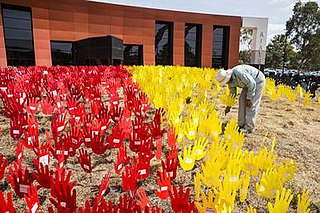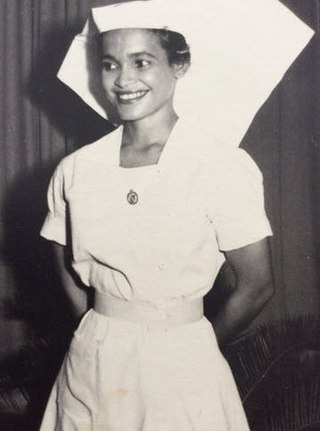Related Research Articles

The Aboriginal and Torres Strait Islander Commission (ATSIC) (1990–2005) was the Australian Government body through which Aboriginal Australians and Torres Strait Islanders were formally involved in the processes of government affecting their lives, established under the Hawke government in 1990. A number of Indigenous programs and organisations fell under the overall umbrella of ATSIC.
Reconciliation Australia is a non-government, not-for-profit foundation established in January 2001 to promote a continuing national focus for reconciliation between Indigenous and non-Indigenous Australians. It was established by the Council for Aboriginal Reconciliation, which was established to create a framework for furthering a government policy of reconciliation in Australia.

The Australian Institute of Aboriginal and Torres Strait Islander Studies (AIATSIS), established as the Australian Institute of Aboriginal Studies (AIAS) in 1964, is an independent Australian Government statutory authority. It is a collecting, publishing, and research institute and is considered to be Australia's premier resource for information about the cultures and societies of Aboriginal and Torres Strait Islander peoples.

The Australian National Aboriginal and Torres Strait Islander Education Policy (AEP) is a national policy adopted by the Government of Australia by each State and Territory government. The policy was first introduced in 1989 and is the foundation of education programs for all Indigenous Australians.
Indigenous Australian self-determination, also known as Aboriginal Australian self-determination, is the power relating to self-governance by Aboriginal and Torres Strait Islander peoples in Australia. It is the right of Aboriginal and Torres Strait Islander peoples to determine their own political status and pursue their own economic, social and cultural interests. Self-determination asserts that Aboriginal and Torres Strait Islander peoples should direct and implement Aboriginal and Torres Strait Islander policy formulation and provision of services. Self-determination encompasses both Aboriginal land rights and self-governance, and may also be supported by a treaty between a government and an Indigenous group in Australia.

The National Congress of Australia's First Peoples was the national representative body for Aboriginal and Torres Strait Islander Australians from 2009 to 2019.
The Aboriginal Medical Services Alliance Northern Territory (AMSANT) is a healthcare policy organisation that serves Aboriginal communities in the Northern Territory of Australia. It is an independent, not-for-profit group that is funded by Australia's federal government, the Northern Territory Government, charities and non-governmental organisations.

Thomas Edwin Calma,, is an Aboriginal Australian human rights and social justice campaigner, and 2023 senior Australian of the Year. He was the sixth chancellor of the University of Canberra (2014-2023), after two years as deputy chancellor. Calma was the second Aboriginal or Torres Strait Islander person to hold the position of chancellor of any Australian university.
The Closing the Gap framework is a strategy by the Commonwealth and state and territory governments of Australia that aims to reduce disparity between Aboriginal and Torres Strait Islander peoples and non-Indigenous Australians on key health, education and economic opportunity targets. The strategy was launched in 2008 in response to the Close the Gap social justice movement, and revised in 2020 with additional targets and a refreshed strategy.
Cindy Anne-Maree Shannon is an Australian academic best known for her work in the field of Indigenous health.

MaryAnn Bin-Sallik is a Djaru Elder and Australian academic, specialising in Indigenous studies and culture. She was the first Indigenous Australian to gain a doctorate from Harvard University.
Pat Turner is an Aboriginal Australian of Gudanji-Arrernte heritage who has worked as a civil administrator for policies which guarantee the right to self-determination for Indigenous people. She was awarded the Order of Australia in 1990 for her service.
Lisa Rae Jackson Pulver is an Aboriginal Australian epidemiologist and researcher in the area of Aboriginal health who has been Deputy Vice Chancellor at the University of Sydney since October 2018.

The Aboriginal and Torres Strait Islander Voice, also known as the Indigenous Voice to Parliament, the First Nations Voice or simply the Voice, was a proposed Australian federal advisory body to comprise Aboriginal and Torres Strait Islander people, to represent the views of Indigenous communities.
The Coalition of Aboriginal and Torres Strait Islander Peak Bodies, usually known as the Coalition of Peaks is an Australian community-controlled peak body whose members comprise Aboriginal and Torres Strait Islander organisations. Its main purpose is to negotiate with the various Australian governments regarding a national agreement on the Closing the Gap framework. Closing the Gap is a government strategy that aims to reduce disparity between Aboriginal and Torres Strait Islander peoples and non-Indigenous Australians on key health, education, and economic opportunity targets.
Constitutional recognition of Indigenous Australians refers to various proposals for changes to the Australian Constitution to recognise Indigenous Australians in the document. Various proposals have been suggested to symbolically recognise the special place Indigenous Australians have as the first peoples of Australia, along with substantial changes, such as prohibitions on racial discrimination, the protection of languages and the addition of new institutions. In 2017, the Uluru Statement from the Heart was released by Indigenous leaders, which called for the establishment of an Indigenous Voice to Parliament as their preferred form of recognition. When submitted to a national referendum in 2023 by the Albanese government, the proposal was heavily defeated.
Patricia Lynette Dudgeon, usually known as Pat Dudgeon, is an Aboriginal Australian psychologist, Fellow of the Australian Psychological Society and a research professor at the University of Western Australia's (UWA) School of Indigenous Studies. Her area of research includes Indigenous social and emotional wellbeing and suicide prevention. She is actively involved with the Aboriginal community, having an ongoing commitment to social justice for Indigenous people. Dudgeon has participated in numerous state and national committees, councils, task groups and community service activities in both a voluntary and professional capacity.
Vanessa Lee-AhMat is an Australian scholar who was the first Aboriginal and Torres Strait Islander PhD graduate from Griffith University School of Medicine. In 2005, Lee-AhMat was recognised by the Parliament of Australia for her dedication and commitment to Thursday Island community, in the Torres Strait.
The Indigenous Advisory Council (IAC), also known as the Prime Minister's Indigenous Advisory Council, existed between 2013 and 2019.
Australian Indigenous advisory bodies are Aboriginal and Torres Strait Islander advisory bodies established or proposed to be established by the Commonwealth and state and territory governments. Calls for such bodies, especially for a Commonwealth level Voice to Parliament, became prominent following the release of the Uluru Statement from the Heart, however similar bodies of various levels of independence have existed since the official end of assimilationist policies in the 1970s and the promotion of self-determination and reconciliation. Such bodies generally advise governments on policies and programmes that affect Indigenous Australians, and represent Indigenous interests in public debate. Other advisory bodies have been established in the context of state treaty process, to advise governments and Indigenous groups to prepare for upcoming negotiations.
References
- 1 2 3 "A Special Tribute Edition" (PDF). NACCHO news. September 2011. Archived from the original (PDF) on 11 March 2015.
- ↑ "Hansard". Parliament of Australia. 24 September 2011.
- ↑ Puggy Hunter Memorial Scholarship Scheme (PHMSS)